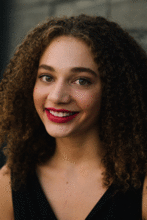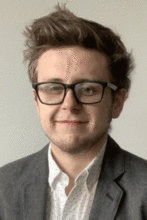Two University of Iowa students have been named 2021 Goldwater scholars.
Nyah Davis is a mathematics major from Des Moines, Iowa, whose algebra research focuses on the representation theory of quivers, or directed graphs. Jack Lynn is a biomedical engineering major from Bettendorf, Iowa, whose area of research is computational biochemistry, specifically RNA biomolecular simulation.
Davis and Lynn are the 59th and 60th Goldwater scholars, respectively, from Iowa and were among 410 undergraduates to receive the honor in 2021.
The Goldwater Scholarship, established by Congress in 1986 in honor of U.S. Sen. Barry M. Goldwater, fosters and encourages outstanding students to pursue careers in the fields of mathematics, the natural sciences, and engineering. The Goldwater is the premier undergraduate award of its type in these fields.
The students were guided through the scholarship application process by their mentors, and by Kelly Thornburg, director of the Office of Scholar Development in University College.
“I admire Nyah, Jack, and each of our nominees for taking on the challenge of representing Iowa at this level of competition,” says Thornburg. “It takes discipline, time, and bravery to do so in normal circumstances. The fact that they prevailed while also navigating this extraordinary moment in our history is just more proof of their commitment to the process of research and discovery.”
Nyah Davis
Davis says one of the reasons she came to Iowa was because it has one of the most racial-, ethnic-, and gender-diverse graduate programs in the country. While that diversity is less evident in the undergraduate program, Davis is actively working to change that by taking leadership roles in student organizations and talking with faculty about translating aspects of the graduate program to the undergraduate curriculum.

She says she also chose Iowa because of the opportunity it presented.
“I did come in as a declared math major, but I’ve been able to take classes in chemistry, art, literature, political science,” she says. “I don’t think I would have had that same chance to explore all my different interests at a STEM-heavy institution.”
What excites Davis about math is figuring out how its different pieces fit together.
“Many of my classes have been focused on one specific area of math. Then from side projects or work with graduate students and professors outside of classes, I started to see all the connections and how the different areas all fit together,” she says. “And it’s so cool. It feels more complex and also more approachable at the same time.”
Her faculty mentor, Ryan Kinser, associate professor of mathematics, supervises her research and helped her with the application process. He says her drive to explore other interests sets her apart from her peers.
“Nyah has also developed talents in several other areas besides mathematics while at Iowa, for example chemistry and drawing,” he says. “This passion to explore different paths will ultimately make her a more creative, well-rounded, and impactful researcher.”
Davis says Kinser is a very approachable and supportive professor.
“It is really cool to have a professor be actively invested in my success,” she says. “He takes the time. He doesn’t just give me a book or a research paper and say, ‘OK, go figure it out.’ He wants to talk about it. He has helped me practice articulating my thought process, which was a skill I needed to develop.”
Davis also sees her experience as a helpful example for other Black students. She is the only Black student in the majority of her math classes, nor is there a Black female professor in the department. But she is in the vanguard of change.
“That doesn’t mean that I couldn’t do it just because I couldn’t see it done,” Davis says. “Don’t let the lack of role models prevent you from pursuing what you are passionate about.”
Jack Lynn
Lynn chose Iowa for reasons similar to many of his peers—it is close to his hometown of Bettendorf, and his sister attended Iowa. He also didn’t have a clear idea of what he wanted to major in and knew Iowa would provide him with ample opportunities to explore his interests.
“Once I chose biomedical engineering, it was a very natural fit,” Lynn says. “What I like about it is it combines my interests in medicine and research, and I love that the problem-solving mindset you have with engineering is more solution oriented.”
Lynn’s research, supervised by faculty mentor Michael Schnieders, focuses on creating physics-based computational models of proteins, nucleic acids, and their interactions with drug molecules. Computational studies complement what can be learned experimentally, ultimately lowering the cost of researching human genetics and developing new drugs.
Lynn says working with Schnieders, associate professor of biochemistry and biomedical engineering, is what makes his experience at Iowa unique.

“He gives a lot of responsibility to undergraduates and allows them to actively participate in research,” Lynn says. “That’s certainly a privilege of being at Iowa.”
Another unique experience? Despite working with one another for more than a year, COVID-19 restrictions have meant that Lynn and Schnieders have never met face to face.
“We’ve never actually met in person, which is hard to believe,” Schnieders says. “I hope to congratulate him in person soon.”
Schnieders says Lynn epitomizes the values emphasized by the College of Engineering.
“He is truly an ‘engineer and something more,’” Schnieders says. “Jack excels at engineering, science, and math disciplines, but I think what sets him apart is how he values and enjoys a diverse body of coursework.”
Some of those courses include German Cultural Activities, Japanese Society and Culture, Beginning Ballet, and Topics in Culture of the Hispanic World. In addition to his research, Lynn works as a teaching assistant for an introductory class on electrical circuits. He says this experience has helped him bring his future career into focus.
“I really enjoy teaching,” Lynn says. “I didn’t think it would be a career goal of mine, but it is now going to be one of my biggest focuses—to do research and teach.”
Schnieders, who earned his undergraduate degree from Iowa and was a Goldwater Scholar himself, says he considers himself fortunate to have received outstanding mentorship during his time at Iowa.
“It’s fulfilling to help Jack achieve his goals and to pay it forward,” he says.
Goldwater Scholarship
Each Goldwater Scholar annually receives an amount equal to the cost of tuition, mandatory fees, books, and room and board minus the amount of support provided for by other sources, up to a maximum of $7,500. Scholars who receive the award as second-year students can expect to receive support for a maximum of two years (four semesters) or until graduation, if sooner. Scholars who receive the award as third-year students can expect to receive support for a maximum of one year (two semesters) or until graduation, if sooner.
Both Nyah Davis and Jack Lynn are third-year students on track to graduate in May 2022.